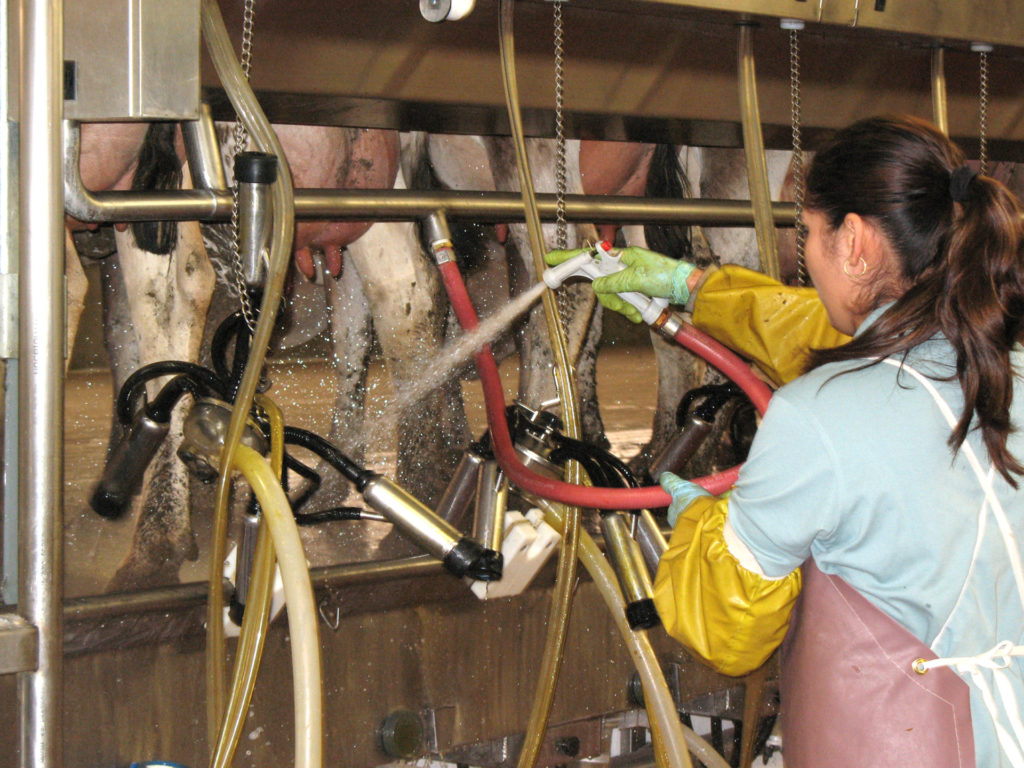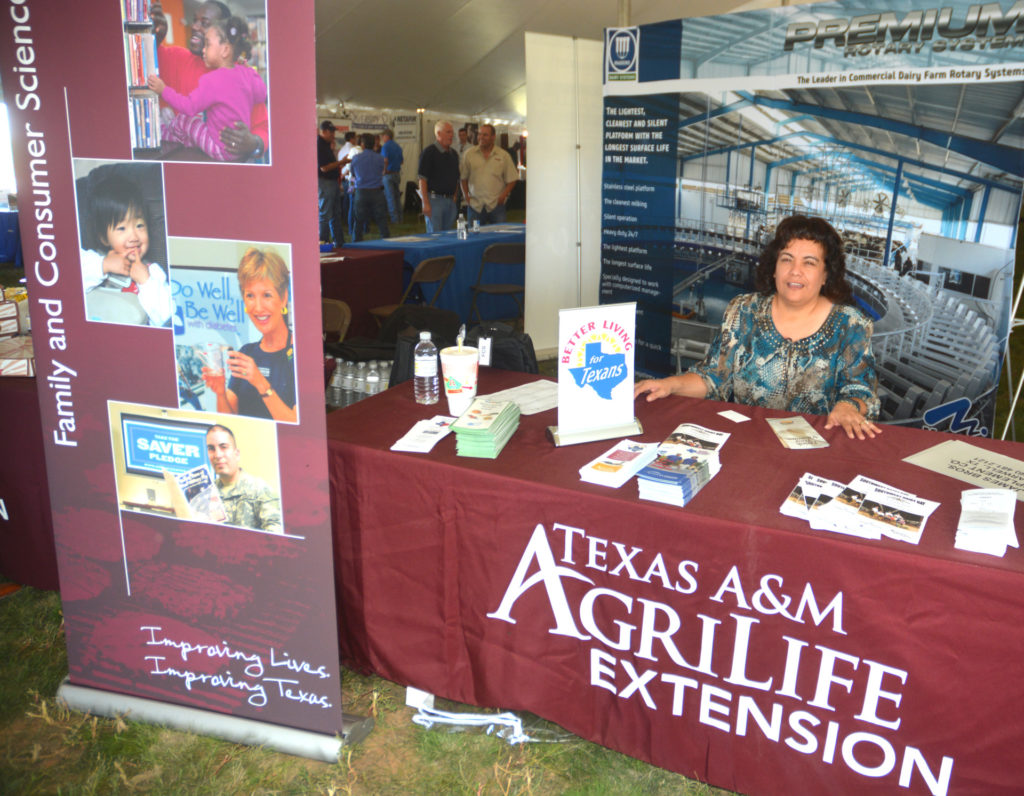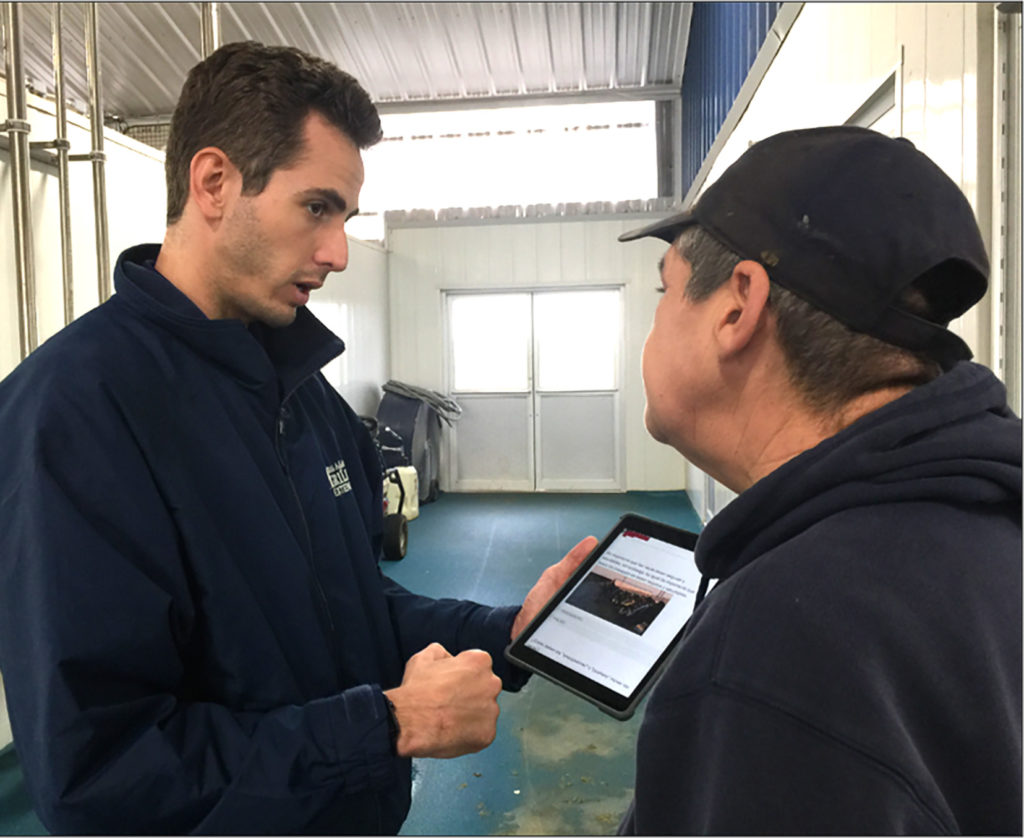From hands-on to conferences, AgriLife Extension dairy industry training impacting owners, managers, laborers
Whether it is allowing students to get up close and personal with a dairy cow’s reproductive tract or educating 20-plus Spanish-speaking dairy industry laborers interactively on iPads on the farm, Texas A&M AgriLife Extension Service is hands-on with training.

Richard DeVuyst, owner of Red River Dairy in Gray County, has grown his dairy herd from 1,200 cows to 3,500 over the past 15 years. He said along the way, getting and keeping trained employees has been one of the most difficult issues.
“There wasn’t much of a dairy industry when we moved here,” DeVuyst said. “We came from California, and there was a trained workforce all around us there. Here you have to train.”
DeVuyst and others attended the recent High Plains Dairy Conference in Amarillo, co-chaired by Juan Piñeiro, Ph.D., DVM, AgriLife Extension dairy specialist in Amarillo, and Robert Hagevoort, Ph.D., New Mexico State University Extension dairy specialist in Clovis, New Mexico. The event attracted almost 400 people from around the nation.
Training opportunities for the dairy industry
The conference is a part of the training collaboration developed for dairy managers, the labor force and the next generation by Texas A&M AgriLife and New Mexico State University’s Extension program.
When the dairy industry began growing in the Texas High Plains and Eastern New Mexico, the two agencies realized training and educational programs were needed for everyone from the owners to the laborers due to the different environment of this region. Initially, the Southern Great Plains Dairy Consortium was founded and included other universities. That consortium has grown now to be the U.S. Dairy Education and Training Consortium.

Piñeiro said the High Plains Dairy Conference is arguably the major conference in the southern High Plains region. Southwest
Dairy Days, a dairy field day to share the newest technologies with dairy farmers and local communities, rotates between the High Plains and Stephenville area and just celebrated its 10th anniversary.
Brand new this year is the 2020 Dairy Herd Manager and Supervisor Training Program, which offers up-to-date knowledge and hands-on training on best management practices. In addition, the dairy specialists do on-farm training and attend many county agent-led programs around the state.
AgriLife Extension makes a Texas difference
“I feel like a lot of the success of the Texas dairy industry is due to AgriLife continually educating producers and helping them adapt to the latest technology in the industry,” said Darren Turley, Texas Association of Dairymen executive director, Austin. “I think the continued advancements we see in our cropping and silage research is crucial to the success of our producers.”
Turley said without AgriLife Extension’s continued education of the workforce on a wide variety of topics, the struggle with labor could lead to more and more incorporation of automation or robotics on dairies.
Individualized training reaches all levels
Piñeiro, a native of Argentina, combines his interests in transition cow management, farm personnel training and dairy cattle reproduction to provide on-farm trainings. Since graduating school he’s been teaching about transition cow management with emphasis on reproductive performance of lactating cows and best calving management practices.

DeVuyst said he thinks it is that combination in his background that makes Piñeiro effective.
“We’ve had Juan come over to train on fresh cows and maternity, cow care and animal handling,” he said. “It’s odd, but I think it’s better if a third party trains, especially if they are bilingual. Juan gets more respect than I do, I think, because he speaks their language and is a dairy veterinarian.”
Piñeiro has the employees take a pre-test to see what they know and then he does four hours of lessons and “holds their attention the whole time,” DeVuyst said. They are tested again after the training and, he said, everyone’s score went up and some of them doubled.
“I believe this training has helped us retain our workforce, because once they’ve gone through these trainings, they have more invested in the job,” he said. “We know it is helping us, because we have third party certification on our dairy, and on the last audit, we got 100%. The auditor said he could count on one hand the number of 100% scores he’s had.”
Training the next generation
Piñeiro and AgriLife Extension dairy specialist Jennifer Spencer, Ph.D., Stephenville, have also stepped up to make sure the dairy education is reaching the next generation. Joey Brooke is leading the Dairy Honors Program, which was formed in the Plainview area to bridge the gap between dairies and youth.
When forming, they solicited help from Piñeiro, Spencer and Nate Wolf, Ph.D., a West Texas A&M University instructor. The program is tailored for local high school students to learn about cattle nutrition, reproduction, breeding, facility design and materials used.
“Now we are discussing an internship this summer and then we want to become state certified where schools can be recognized for participating,” Brooke said. “It is good for all ages to have a positive view of the dairy industry, and this is the next generation. Juan and Jennifer helped develop training materials in a way that the students weren’t bombarded but were able to learn the information.”
Training in a language and format for all to understand
Hagevoort also announced during the conference that the latest consortium dairy workforce training videos: Feed and Feeding, A Noble Purpose, were being released in collaboration with Diamond V Mills and the U.S. Dairy Education and Training Consortium.
All the 2011 and 2012 “Considering Human and Animal Safety” training videos that initially started on DVDs have now been placed online also, he said. The videos include animal handling training and live demonstrations, from the classroom to the farm. They address “why” things are done the way they are, so employees not only know what is supposed to be done, but why it is important it is done in a certain way. This material is available in English, Spanish and K’iche’, which is the language spoken by many laborers from Central America.
“We’ve put all that training on iPads so any individual can receive individualized training,” Hagevoort said. “And we can put some questions in there with multiple choice answers for the workers. It helps with those who have trouble reading and comprehending to have the educational materials offered by video and audio.”
More information about AgriLife Extension’s dairy program can be found at Texas Dairy Matters.





